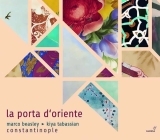 La Porta d’Oriente - The Manuscript of Ali Ufki; Tasso: Gerusalemme libertata XII: 52-54, 59-61, 64-68; Monteverdi: Combattimento di Tancredi e Clorinda; Caccini: Dalla porta d’Oriente; Saracini: Quest’amore, quest’arsura; Strozzi: Che si pou fare; Borrono: La Canella; Kircher: Compendium Tarantulae; Anonymus: La campana sona + Tarantelle Como sencza la vita + Canto tradizionale / Tabassian: Fronni d’alia + Ey Sareban; Marco Beasley, Ensemble Constantinople, Kiya Tabassian; 1 CD Glossa GCD924501; Aufnahme 05/2019, Veröffentlichung 06/2020 (77'57) - Rezension von Norbert Tischer
La Porta d’Oriente - The Manuscript of Ali Ufki; Tasso: Gerusalemme libertata XII: 52-54, 59-61, 64-68; Monteverdi: Combattimento di Tancredi e Clorinda; Caccini: Dalla porta d’Oriente; Saracini: Quest’amore, quest’arsura; Strozzi: Che si pou fare; Borrono: La Canella; Kircher: Compendium Tarantulae; Anonymus: La campana sona + Tarantelle Como sencza la vita + Canto tradizionale / Tabassian: Fronni d’alia + Ey Sareban; Marco Beasley, Ensemble Constantinople, Kiya Tabassian; 1 CD Glossa GCD924501; Aufnahme 05/2019, Veröffentlichung 06/2020 (77'57) - Rezension von Norbert Tischer

Der italienische Sänger Marco Beasley und das kanadische Ensemble Constantinople haben sich für ein Programm vereint, das Musik italienischer Komponisten und Stücke aus der Sammlung des polnischen Musikers, Komponisten, Notensammlers und Übersetzers Albert Bobowski alias Ali Ufki (um 1610–1675) enthält. Ufki machte seine Aufzeichnungen als Serail-Musiker am ottomanischen Hof. Das Manuskript, das sich heute in der Nationalbibliothek in Paris befindet, umfasst Werke der osmanischen und persischen Musik, aber auch europäische Musik aus Deutschland, Frankreich und Italien.
Mit Ufkis Musik und jener der Italiener kreist das Programm um die Geschichte von Tancredi und Clorinda. Der rote Faden von La Porta d’Oriente ist der Text von Gerusalemme libertata, einem epischen Gedicht von Torquato Tasso. Die Episode Il combattimento di Tancredi e Clorinda wurde von Claudio Monteverdi vertont. Tancredi, ein christlicher Prinz, verteidigt Jerusalem gegen die Sarazenen, denen einige Ritter zur Seite stehen, darunter eine Frau namens Clorinda. Tancredi verliebt sich in Clorinda, aber seine Liebe wird nicht erwidert. Er besiegt sie im Zweikampf, aber auf ihrem Sterbebett bittet sie, um ihre Seele zu retten, von Tancredi getauft zu werden. Aus den Religionskämpfen und der Befreiung Jerusalems wird eine tragische Liebesgeschichte.
Marco Beasley und das Ensemble Constantinople wechseln mit verblüffender Selbstverständlichkeit zwischen den Musikkulturen und entführen den Hörer auf höchstem musikalischem Niveau in eine Welt voller Exotik und Emotionen.
The Italian singer Marco Beasley and the Canadian ensemble Constantinople have joined forces for a programme including music by Italian composers and pieces from the collection of the Polish musician, composer, collector and translator Albert Bobowski alias Ali Ufki (ca. 1610-1675). Ufki made his notes as a seraglio musician at the Ottoman court. The manuscript, now in the National Library in Paris, includes works of Ottoman and Persian music, but also European music from Germany, France and Italy.
With Ufki’s music and that of the Italians, the programme revolves around the history of Tancredi and Clorinda. The central theme of La porta d’Oriente is the text of Gerusalemme Libertata, an epic poem by Torquato Tasso. The episode Il combattimento di Tancredi e Clorinda was set to music by Claudio Monteverdi. Tancredi, a Christian prince, defends Jerusalem against the Saracens, who are assisted by several knights, including a woman named Clorinda. Tancredi falls in love with Clorinda, but his love is not returned. He defeats her in a duel, but while dying and wanting to save her soul, she asks to be baptized by Tancredi to save her soul. Thus, the religious battles and the liberation of Jerusalem turn into a tragic love story.
Marco Beasley and the Ensemble Constantinople switch between the musical cultures with astounding naturalness and carry the listener away on the highest musical level into a world full of exoticism and emotions.






















